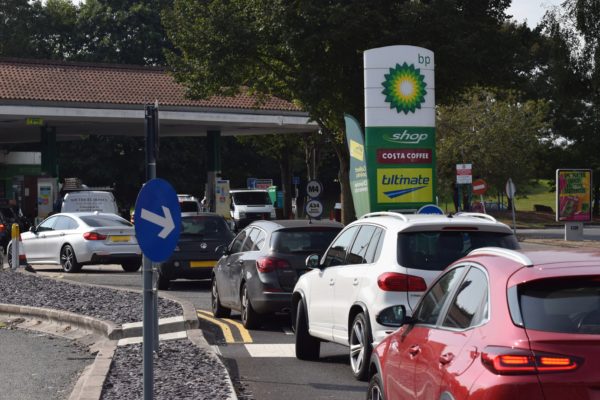UK journalists hit back at claims that the media is to blame for fuel crisis
On Tuesday, a YouGov poll found that 47% of respondents believed that the media was most to blame for UK petrol stations running out of fuel. This is compared with 23% who said the government, and 22% who said the public. Clearly, it’s a worrying time for press trust when an industry that is responsible for neither energy nor infrastructure is singled out for causing fuel shortages. So what’s gone wrong? And where do we go from here?
I put that question to Ian Carter, Editorial Director for Iliffe Media, who published an article on the same day titled ‘Why we shouldn’t blame the media for the panic buying of petrol’. In it, he says the theory doesn’t stand up to a moment’s examination and here, in this exclusive interview for FIPP, he gives us his views on why the UK public’s perception of the media is in the state it’s in today:
“It’s hard to say whether distrust in the press has increased in the UK in recent years as we didn’t really have a base level to work from,” says Carter. “What’s absolutely clear though is that people feel far more willing to be abusive towards journalists than they used to be – whether that’s a sign of distrust or just the country’s mindset in general is hard to say.”
“The UK remains bitterly divided, largely due to Brexit, and it’s hard to see how that will fix itself and the level of debate and argument has certainly sunk to new lows. The country has lurched from crisis to crisis in recent years. There is a deep distrust of authority and unfortunately I fear the press is viewed as being part of the establishment – and abused accordingly.”
One factor that we definitely do know has played a part in eroding confidence in content more generally online, is social media. FIPP’s Global Media Tech Regulation Tracker keeps tabs on policy, regulatory, and legal attempts to effectively govern such platforms, including those designed to combat fake news.
However, as Ian points out, the dissemination of false information is not the only issue that social media creates for the traditional press online. The ability to attack facts through opinion alone, in environments that seem to give the two equal weighting, is also not helping.
“I think social media, and in particular Facebook, plays a large role in generating ill-feeling towards the press as so much unchecked nonsense gets posted. I read a post this morning, on a Facebook page set-up to provide information on fuel availability, which said the only reason reporters on my local paper in Brighton were covering the issue was because investors in their ultimate parent company Gannett also held shares in BP and Shell.”
“It’s absolute nonsense – the idea that senior managers at Gannett would be directly orchestrating the current UK fuel issues is beyond laughable. But it’s a comment that was shared multiple times, spreading a complete untruth as if it were a verified fact.”
“I wrote a response to the numbers of social posts I had seen blaming the media for the fuel crisis, but did so in the knowledge I would be on a bit of a hiding to nothing. Sure enough, there were hundreds of comments posted on the article, the majority negative. You can only hope though that for every 100 people happy to insult you, one or two may stop and think.”
Interestingly, he raises another potential cause of press mistrust in the UK that I must confess I have not personally considered for some time…
“It’s also clear that all press – be that local, regional or national – continue to be swept up in the aftermath of the phone hacking scandal, despite it involving a small number of people on a small number of tabloid titles. I have lost count of the number of times I have seen local journalists described as ‘phone hackers’ despite there never being so much as a suggestion that journalists at a regional level indulged in this sort of illegal activity.”
The Iliffe Editor says that finding answers to the issue of press mistrust will be difficult, but reminds us of the importance – and purpose – of a properly functioning media.
“I think as an industry we need to be prepared to put our collective head above the parapet and correct misleading claims, even when it can feel like a thankless task.”
Carter wasn’t the only journalist to respond to the ill-founded claims that the media is to blame for UK fuel shortages this week. Raymond Snoddy, former Media Editor of both The Times and the FT, Presenter of BBC News Watch and now an independent Writer and Media Consultant, wrote his own piece for Mediatel, along similar lines:
“In the real world, the argument doesn’t stack up for a second. It is not the job of the media to suppress information but to report facts as they find them. Can you think what opprobrium would be poured over the BBC – or any broadcaster – if stories were withheld deliberately to prevent panic-buying. Even if you wanted to, the stories would inevitably seep out anyway, probably in a more exaggerated form.”
“Meanwhile, the French have not pulled their punches on a more likely cause of the problem than the media. Michel Barnier, the former chief EU negotiator says quite simply, the driver shortage ‘is a direct consequence of Brexit,’ while the French European Affairs Minister, Clement Beaune noted ‘every day we can see the intellectual fraud that is Brexit.’ More practically, the head of the Polish lorry drivers union says he does not believe his members will be taking up the 5,000 temporary UK visas, which last only until Christmas Eve. They left because of ‘abuse and red tape’ and will not be coming back.”
The false narrative even spilled over into light-hearted ‘banter’ on breakfast television, as Guest and Comedian Jason Manford told the Good Morning Britain team, “And also the news cycle and you guys talking about it every morning it fuels… I’m not saying you are to blame but it’s part of the cycle, isn’t it and it’s part of the panic in people, everything fuels ironically, each other.”
Presenter and Journalist, Susanna Reid stepped into refute the claims: “Don’t blame us.”
Ultimately, the disconnect between fantasy and reality as regards this episode in the UK socio-political sphere makes for disconcerting reading. At times the truth is hard, but as Carter says, it’s imperative that we keep on reporting it.
Main Image: Shutterstock/Amani A









